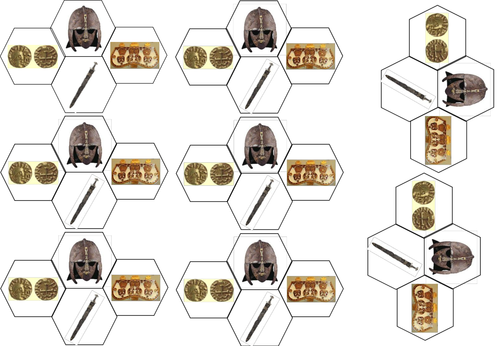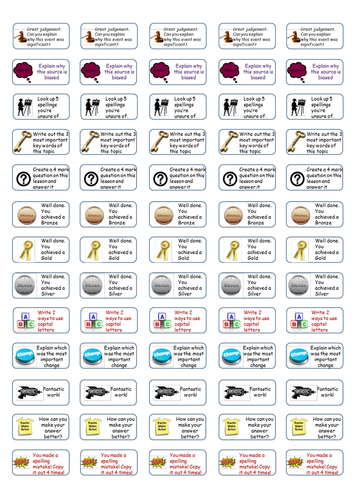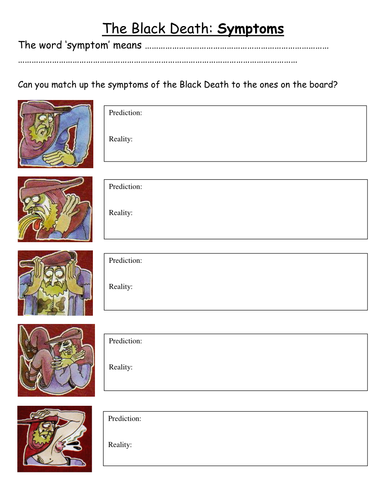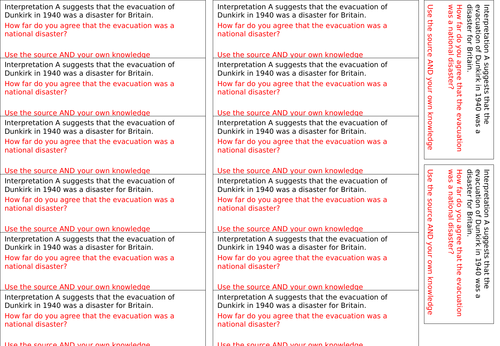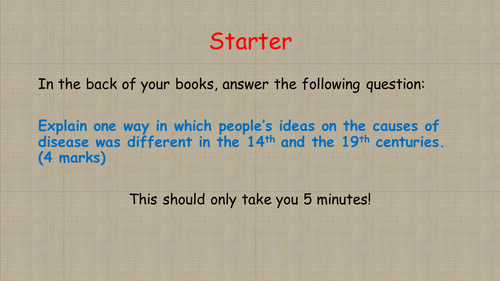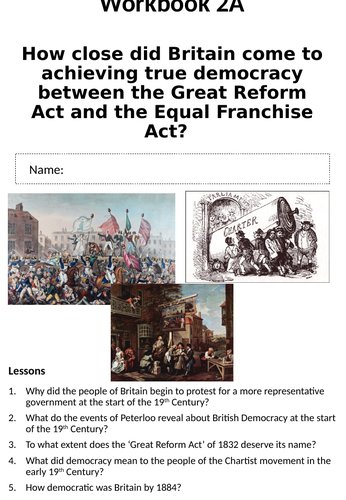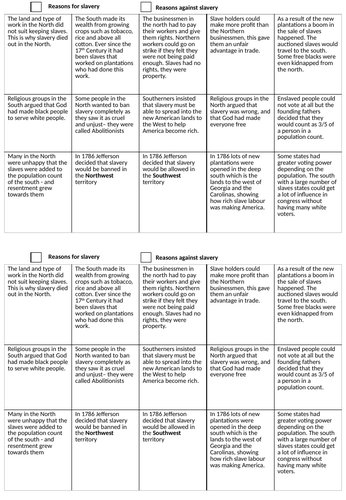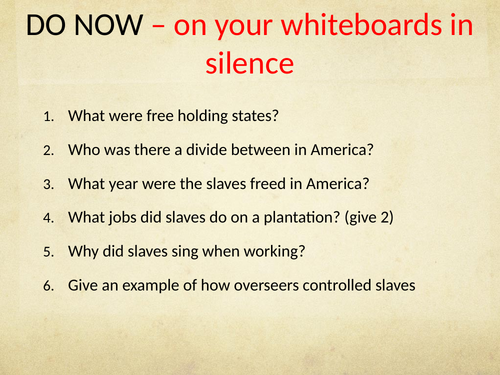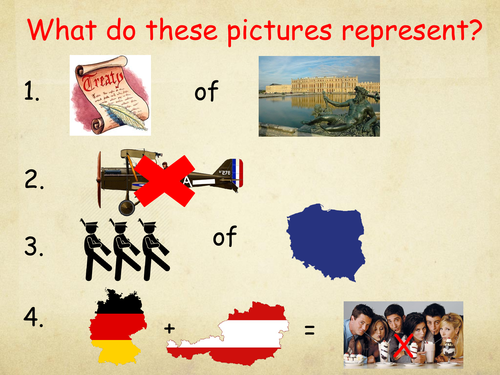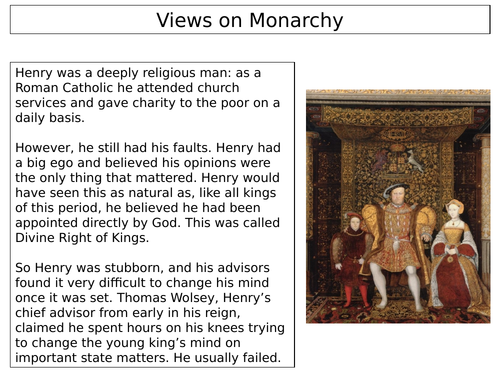
86Uploads
24k+Views
11k+Downloads
All resources

KS3/KS4 History: Anglo-Saxon England Scheme of Work
Suitable for KS3/KS4/KS5 curriculum - easily adaptable across the age/ability levels.
All lessons provided with HA and LA PowerPoints and resources/worksheets.
Knowledge Organiser (for use in homework) and Knowledge Organiser tests also provided.
Assessments/assessment preparation lessons are also provided.
Scheme of Work lessons:
1. How do objects found at Sutton Hoo help historians to learn more about the Anglo-Saxons?
2. How did Christianity change Anglo-Saxon England?
3. Why did Vikings raid England?
4. Do the Vikings deserve their bloodthirsty reputation?
5. Was Alfred the Great really so great?
6. Mini Assessment and Knowledge Test
7. Why is Anglo Saxon England known as the Dark Ages?
8. Why is 10th Century England seen as the Anglo-Saxon Golden Age?
9. Assessment Preparation
10. Assessment (+sentence starters)
All individual lessons are available on my TES page

Marking Stickers
marking stickers with activities for students to complete, and praise stickers. Print off onto sticker paper.
Perfect for easy marking and higher level questioning/thinking

KS3 History: Black Death Scheme of Work
Suitable for KS3. Six lesson SOW including assessment and peer marking grids. Focus on embedding the new Edexcel GCSE exam skills at KS3. Uses GCSE command words to get all familiar with the words used at KS4. Easy to differentiate and fun, active plenary. All resources are simple and accessible. GCSE skills include; infering from a source, writing a narrative, explaining the main difference between 2 interpretations, explain essays.
Suitable for a school who teaches KS3 once a week - lessons are easily adaptable to extend if required. Focusses on symptoms, arrival, causes, cure, impact

KS3 History: Impact of the Black Death Assessment
Impact of the Black Death assessment.
Resources available:
assessment
peer marking sheet
marking codes available to reduce marking

KS4 History Edexcel: Women in Weimar Germany
Role of women in Weimar Germany and how it changed after WW1. Practice of new Edexcel (2016 start) 4 mark question. Resources included.

KS3 History: Dunkirk Assessment Preparation & Assessment
KS3/KS4 Assessment preparation and Assessment on the Dunkirk Evacuation - focussing on whether it was a triumph or a disaster.
Assessment involves an interpretation and the following questions:
What does Interpretation A suggest about Dunkirk?
Why would the author of this Interpretation have this view?
How far do you agree with Interpretation A that Dunkirk was a disaster?

KS3 History: Were the Romans really rotten?
Year 7 lesson on whether the Romans were really rotten.
Introduction into inference questions, with peer marking and stickers provided (just print off onto sticker paper)
Written tasks and source information also used in the lesson.
Good as a MA class and easily adaptable to HA or LA.

KS3 History: What does Sutton Hoo tell us about the Anglo-Saxons?
KS3 lesson on how the discoveries at Sutton Hoo tell us about how the Anglo-Saxons lived.
Students are using their inference skills.
Easily adaptable

KS4 Edexcel History: Industrial Hospitals - Edexcel Medicine Through Time
New specification of Edexcel British Medicine through time 1250- present.
This focuses on Hospitals during the Industrial Period of 1700-1900 (18th Century - 19th Century)
The lessons focuses on how they changed, and allows the students to tackle a PEEL paragraph which are required for a 12 mark question.

KS3 History: Democracy and Suffrage 1800-1885 Booklet and SOW
SOW and booklet based on Democracy and Suffrage between 1800-1884.
Focus on how men won the vote in the 19th Century. Lots if interpretations, sources, literacy tasks. Strong resources, and lessons to accompany. Knowledge Organiser and homework tasks.
Lessons:
Why did the people of Britain begin to protest for a more representative government at the start of the 19th Century?
What do the events of Peterloo reveal about British Democracy at the start of the 19th Century?
To what extent does the ‘Great Reform Act’ of 1832 deserve its name?
What did democracy mean to the people of the Chartist movement in the early 19th Century?
How democratic was Britain by 1884?

How did slavery change America?
Lesson 1 of a SOW on slavery in America.
focussing on how America was affected by slavery, the north/south divide etc and reasons for slavery
high level of challenge throughout

How useful is 12 Years a Slave when studying plantation life?
Interpretation lesson based on 12 Years a slave - worksheets and clip provided
please note that the quality of the clip isn’t great

KS3 History: What were the causes of the Industrial Revolution?
Year 8 lesson focusing on the causes of the Industrial Revolution - embedding GCSE skills at KS3 (focus on new Edexcel specification)
They have to work as a pair to pick the top 9 causes, then rank them in a diamond nine.
Answer 1 paragraph on a ‘How far do you agree…?’ question.
easily adaptable for LA and MA

KS3 History - How was Hitler able to conquer most of Europe by 1941?
KS3 lesson on how Hitler was able to conquer most of Europe by 1941.
Activities include:
Map skills - mapping out the German allies and the countries invaded.
Blitzkrieg - studying how effective Blitzkrieg was.
Suitable for KS3 & KS4 - and easily adapted to all abilities

KS3 History: How did the Blitz affect London?
KS3 History: How did the Blitz affect London?
The lesson is originally planned for Year 8, but is easily adapted for any level.
The lesson focusses on how the Blitz affected London, the students make their own Blitz textbook and fill it in with peer marking
Videos included - fun interactive lesson

KS3 History: Who was Henry VIII?
First lesson in SOW that focuses on who Henry was when he became King in 1509, with detailed information, videos etc.
suitable for KS3 - easily adaptable for KS4 and all abilities

KS3 History: How did Christianity change Anglo-Saxon England?
KS3 lesson on how the conversion to Christianity changed England.
Inference skills, judgement skills. Easily adaptable

KS3 History: Why did the Vikings raid England?
KS3 - easily adapted to KS4
focus on the reasons behind the Viking raids on England.
Easily adapted to LA

KS3 History: The Final Solution
Students look at sources in groups and decide which ones best describe the Final Solution and why, Great for group work, interpretation and analysis of sources. Justfication of their choice and peer feedback

KS3 History: Who should be King in 1066?
Introduction to Medieval England. Who should be King in 1066. Group work and peer assessment. Resources included.

